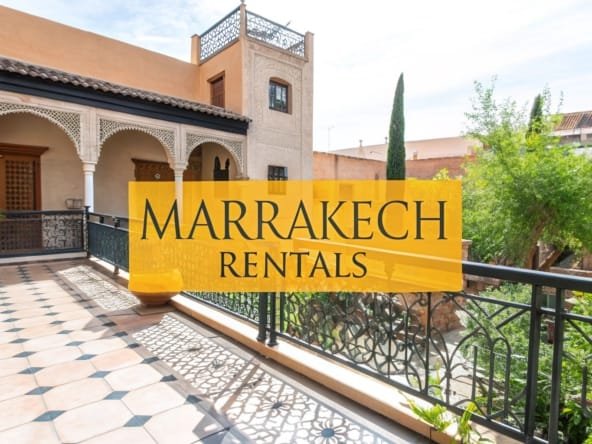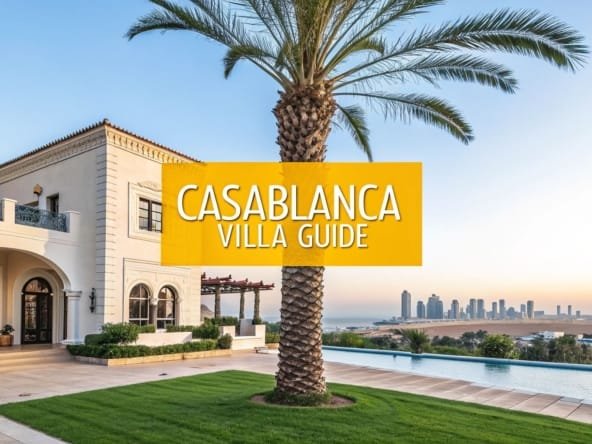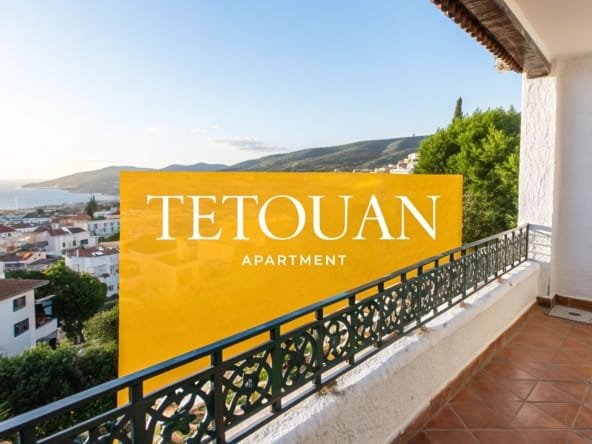So, you're looking to rent an apartment in Fes? It’s a fantastic choice, and a real adventure into the heart of Morocco. Whether you picture yourself in a sleek, modern flat in the Ville Nouvelle or tucked away in a historic Riad inside the Medina, finding the right place starts with knowing the city's unique neighbourhoods. This guide will give you the lay of the land, helping you match your lifestyle and budget to the perfect Fes home.
Your Essential First Look at Renting in Fes
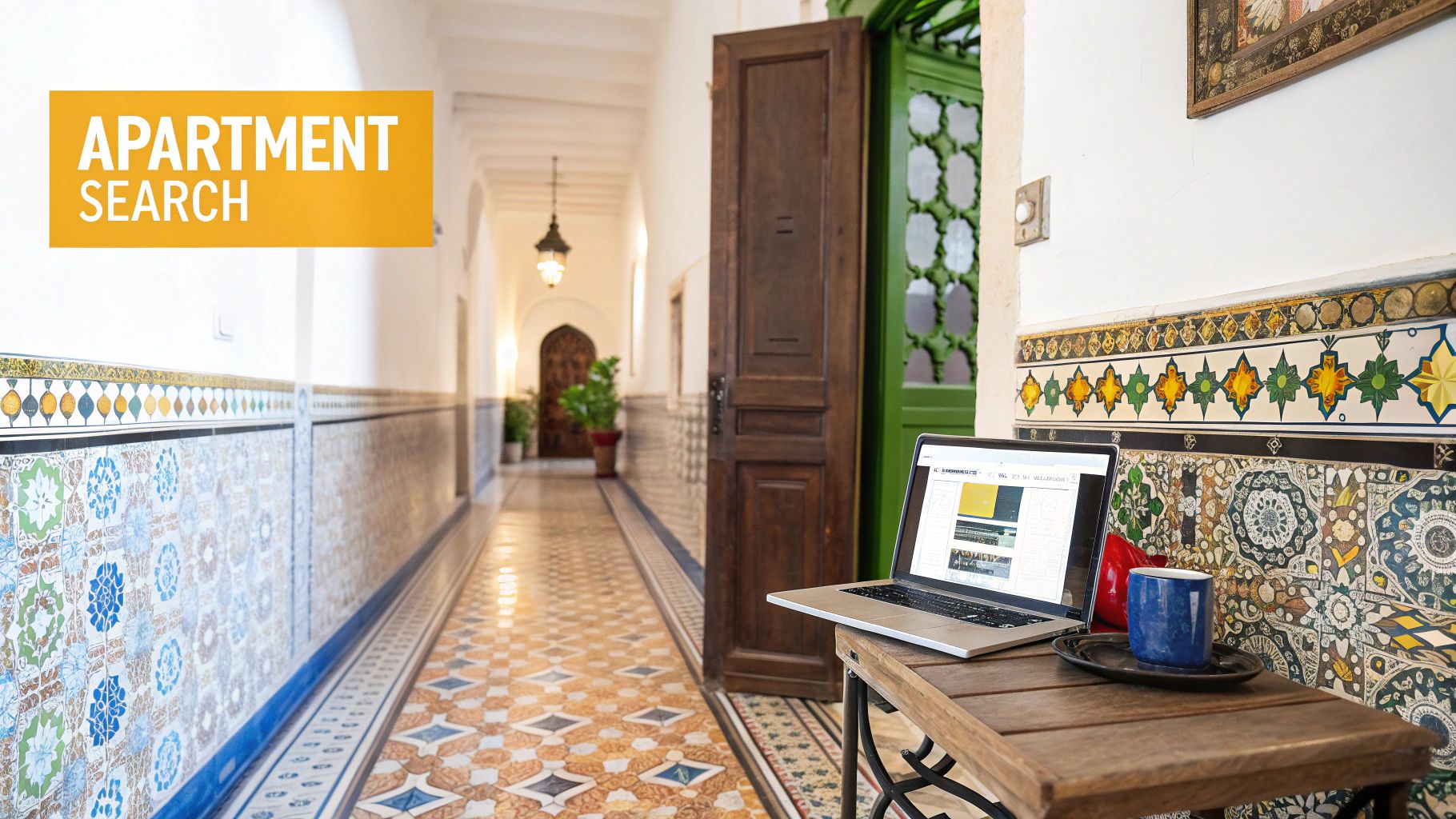
Renting in Fes isn't just about finding a place to live; it's about choosing the kind of daily life you want to experience. The city is a study in contrasts, split between the ancient, winding alleyways of Fes el-Bali (the Medina) and the modern, French-inspired Ville Nouvelle. Each offers a completely different rhythm.
Your hunt for a location appartement Fes really starts here. Do you want to live surrounded by centuries of history, with artisan workshops and bustling souks right outside your door? That's the Medina. Or do you prefer the convenience of wide avenues, contemporary buildings, and familiar comforts like big supermarkets and trendy cafés? Then the Ville Nouvelle is for you.
Understanding the Current Rental Scene
The property market in Morocco is always on the move, and that definitely has a knock-on effect on rent and availability in a city like Fes. The national real estate market is buzzing. For context, across the wider housing market, properties were selling in an average of just 33 days back in mid-2025. That kind of speed is a clear sign of high demand. While those stats are for sales, the rental market often follows the same energetic pace. You can get a better sense of these national trends by checking out resources like aparthotel.com.
What this means for you is that the best flats, particularly in the most popular areas, get snapped up fast. You need to be ready to move when you find something you love.
If there's one piece of advice I can give, it's this: have your documents and deposit organised before you even start viewing places. In a competitive market, being able to commit on the spot can be the one thing that secures you the apartment.
What Can You Expect for Your Money?
Your budget is, of course, going to steer your search more than anything else. To help you set realistic expectations, here's a rough idea of what you might pay each month for a standard two-bedroom apartment in different parts of Fes. Keep in mind these are just estimates; prices will shift depending on the building's age, whether it’s furnished, and the exact street.
Estimated Monthly Rental Prices in Fes by Area
This table provides a snapshot of average rental costs to help you narrow down your search.
| Neighbourhood | Average Monthly Rent (MAD) | Key Characteristics |
|---|---|---|
| Ville Nouvelle | 4,500 – 7,000 | Modern amenities, accessible by car, close to shops |
| Fes el-Bali (Medina) | 3,000 – 5,500 | Historic, authentic, pedestrian-only access |
| Batha-Oued Fejjaline | 3,500 – 6,000 | Mix of traditional and modern, near the Medina gates |
| Ain Nokbi | 2,500 – 4,500 | Quieter, more residential, often unfurnished |
With these figures, you can start to focus your energy. If modern convenience is your top priority and your budget allows, the Ville Nouvelle is the obvious place to start. But if you’re chasing a truly authentic cultural experience and perhaps a lower price point, the Medina is calling your name. This is the foundation—now you can begin your search with a clear, practical plan.
Choosing Your Fes Neighbourhood: A Lifestyle Decision
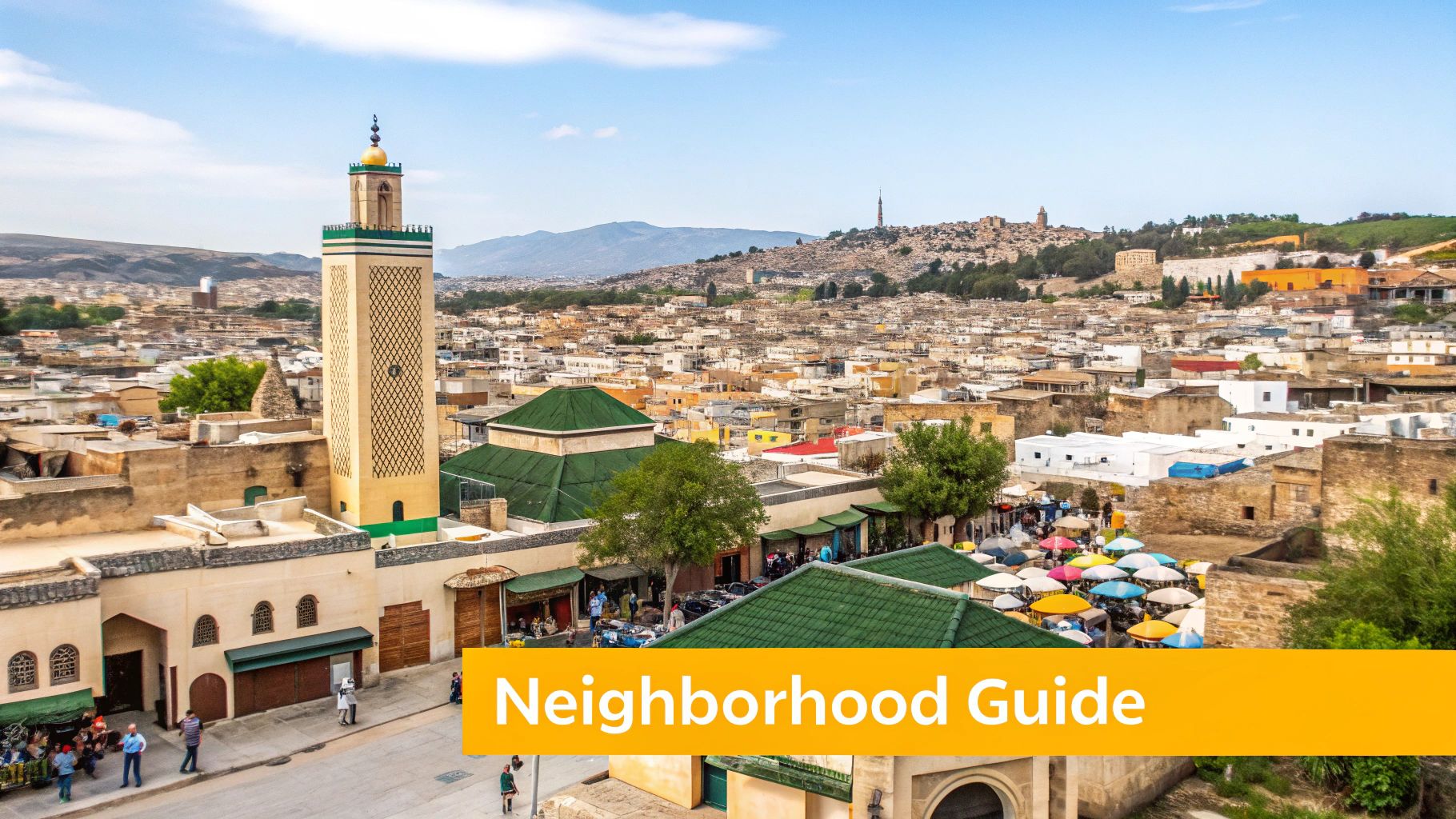
Before you even think about the size of the kitchen or the number of bedrooms, your first and most critical decision is where in Fes you want to live. This choice will shape your daily experience more than anything else. It's not just about finding a flat; it's about finding your rhythm. Your search for the perfect location appartement Fes is really a search for your ideal lifestyle.
The city is a tale of two worlds. You have the ancient, labyrinthine Fes el-Bali—a UNESCO World Heritage site buzzing with centuries of history. Then, you have the Ville Nouvelle, with its modern, European-style layout and conveniences. Each offers a completely different way of life.
The Medina: An Immersion in Fes el-Bali
Living in Fes el-Bali is an invitation to step back in time. You’re not just renting an apartment; you’re becoming part of a living museum. Your neighbours might be artisans whose families have perfected their craft over generations. The soundtrack to your day will be the call to prayer, the animated chatter of the souk, and the clatter of donkey hooves on ancient cobblestones.
An apartment here is often a beautifully restored dar (a traditional home), placing you at the heart of authentic Moroccan culture. You'll quickly find your favourite produce vendor and a local café that feels a world away from any global chain. But this authenticity comes with its own unique set of challenges.
- Access: Much of the Medina is a car-free zone. Be prepared to carry your shopping home and forget about parking at your doorstep.
- Energy: The Medina is always alive. For some, its constant vibrancy is exhilarating; for others who crave quiet, it can feel a bit overwhelming.
- Infrastructure: While many properties have been wonderfully renovated, you might encounter older plumbing or less consistent utilities than you'd find in a modern building.
This is a life for the adventurer, the cultural enthusiast, and anyone who thrives on rich sensory experiences. It’s an unforgettable way to live in Fes.
The Ville Nouvelle: Modern Comforts and Convenience
The Ville Nouvelle, built during the French protectorate, is a world away from the Medina's beautiful chaos. It’s defined by wide, tree-lined boulevards, modern apartment blocks, and familiar shops and restaurants. This part of the city is all about order and convenience.
If you have a car or your work requires easy travel, the Ville Nouvelle is often the more practical choice. You'll find large supermarkets, international dining, and easy access to taxis and public transport. The apartments themselves are typically more spacious and come with modern amenities like lifts, underground parking, and sometimes even communal pools. You essentially trade the Medina’s ancient charm for contemporary ease.
A key consideration is the ease of daily logistics. In the Ville Nouvelle, a quick drive to Carrefour for weekly shopping is simple. In the Medina, that same task becomes a more involved journey, often requiring multiple stops at smaller speciality shops.
Finding Your Balance in Other Areas
Of course, Fes isn't just a choice between old and new. Several neighbourhoods offer a fantastic middle ground. Areas like Batha, for example, are perched right on the edge of the Medina. This gives you the best of both worlds: you can walk to the historic gates but are still close enough to the Ville Nouvelle to hop in a taxi or run errands easily.
For a quieter, more local residential feel, neighbourhoods such as Ain Nokbi are worth a look. These areas are popular with Moroccan families and tend to offer larger, unfurnished flats at more affordable rates. Life here moves at a slower pace, offering a different kind of immersion away from the main tourist hubs. This variety of lifestyles is common across Morocco's cities; for instance, you can learn more about how Marrakech offers diverse property options in our related article.
Ultimately, picking the right neighbourhood comes down to being honest with yourself. What are your non-negotiables? Spend real time in each area you're considering. Walk the streets in the morning, afternoon, and evening to truly get a feel for the atmosphere before you commit. This on-the-ground research is the best way to ensure your new home supports the life you want to lead.
How to Find Your Perfect Apartment in Fes
So, you’ve picked a neighbourhood. Great. Now comes the exciting part: the actual hunt for your ideal location appartement Fes. This is where modern convenience meets old-school networking, and learning to navigate both is the key to finding a place you’ll genuinely love.
Think of your search as having two main paths. You’ve got the online portals, which are fantastic for a quick overview, and then you have the traditional, on-the-ground approach, which is often how you discover those real hidden gems that never make it online. A smart strategy involves a bit of both.
Before you dive in, this graphic breaks down the essential prep work.
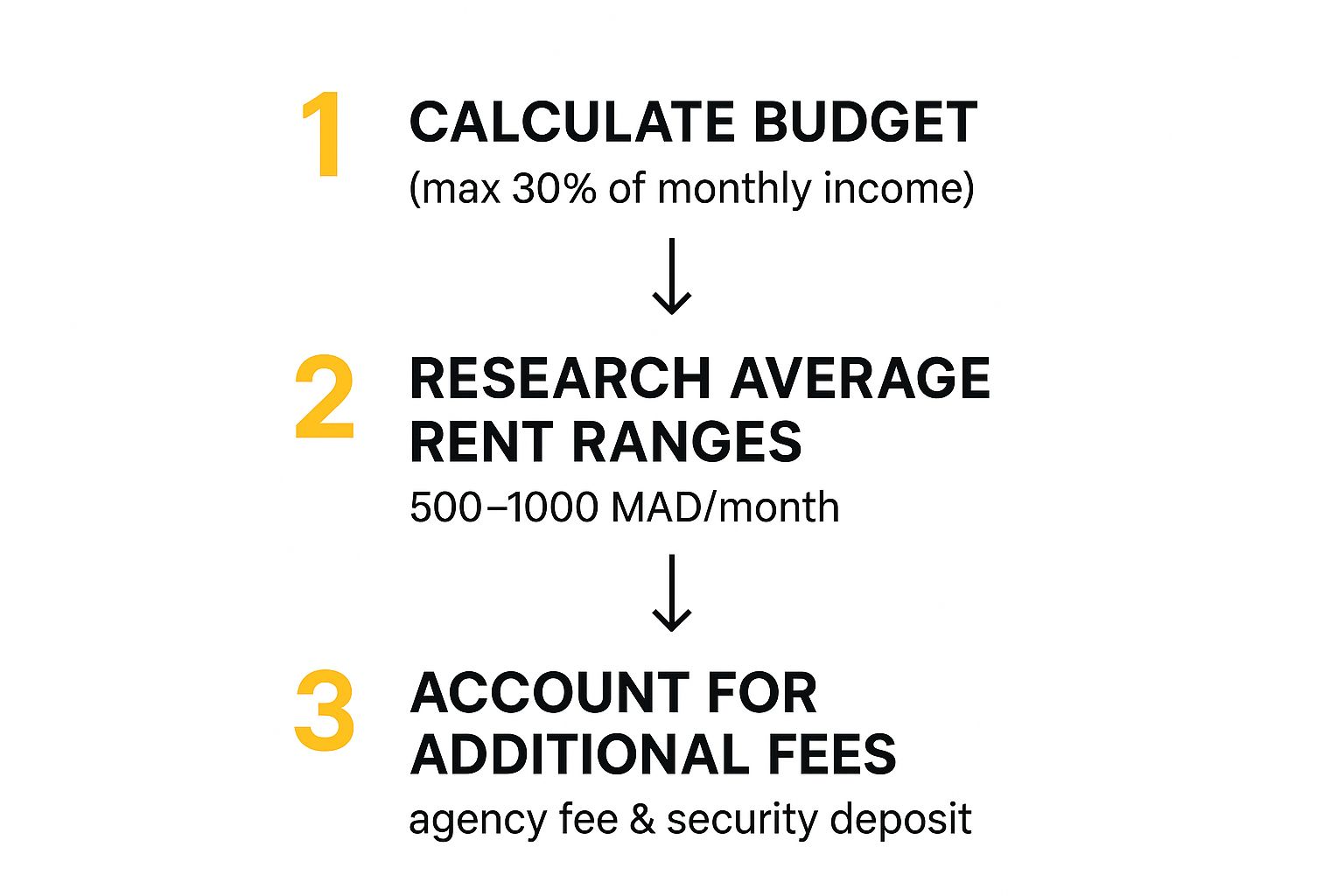
As you can see, getting your finances in order first is crucial. A clear budget and an understanding of all the costs involved will make the entire rental process much smoother.
Tapping into Online Rental Platforms
Your first port of call online should be the big Moroccan property portals. Sites like Mubawab and Sarouty are the heavyweights, listing thousands of properties across Fes. They’re brilliant for getting a baseline understanding of current market rates and seeing what your budget gets you in different areas.
A word of caution, though: approach these sites with a healthy dose of realism. Listings can be outdated, and sometimes, they aren’t quite what they seem.
Here’s what I’ve learned to look for when searching online:
- Photo quality is telling: Listings with plenty of clear, bright photos are usually a good sign. Be wary of ads with just one or two fuzzy pictures.
- Check the posting date: I always filter for listings posted in the last few weeks. Anything older is likely already off the market.
- Read the description carefully: A vague description is a major red flag. A motivated landlord or agent will include specifics about the apartment's features, size, and location.
I've seen this happen more than once: you fall in love with an apartment online, only to find the photos were of a much nicer flat in the same building. Always, always confirm that the images you see are of the exact unit you're going to visit.
The Power of the Semsar
While online listings are a good start, many of the best deals in Fes—especially in the Medina—are found through a semsar. Think of a semsar as a traditional, hyper-local real estate broker. They operate entirely on word-of-mouth and personal connections, holding the keys to a vast, unlisted rental market.
Finding a reliable semsar is everything. The best way is to ask for a recommendation. Talk to other expats, your new colleagues, or even the owner of a café you like. A good semsar will actually listen to your criteria—your budget, desired area, and non-negotiables—and won't waste your time showing you places that don't fit.
It's vital to understand their fee structure from the outset. A semsar’s commission is almost always paid by you, the renter. The standard fee is equivalent to one month's rent, which you pay when you sign the lease. Make sure you confirm this arrangement upfront to avoid any awkward conversations later.
Communicating Your Needs Clearly
Whether you're calling an agent from an online ad or meeting with a semsar, clarity is your best friend. Be incredibly specific about what you’re looking for right from the first conversation.
Don’t just say, "I need a nice two-bedroom apartment." That's too vague.
Instead, try something like this: "I am looking for a two-bedroom, unfurnished apartment in the Batha neighbourhood, with a maximum budget of 4,000 MAD per month. Good natural light and a modern kitchen are essential. I am ready to move in next month." This level of detail helps your agent zero in on the perfect location appartement Fes and saves everyone a lot of time.
Understanding the True Cost of Renting in Fes
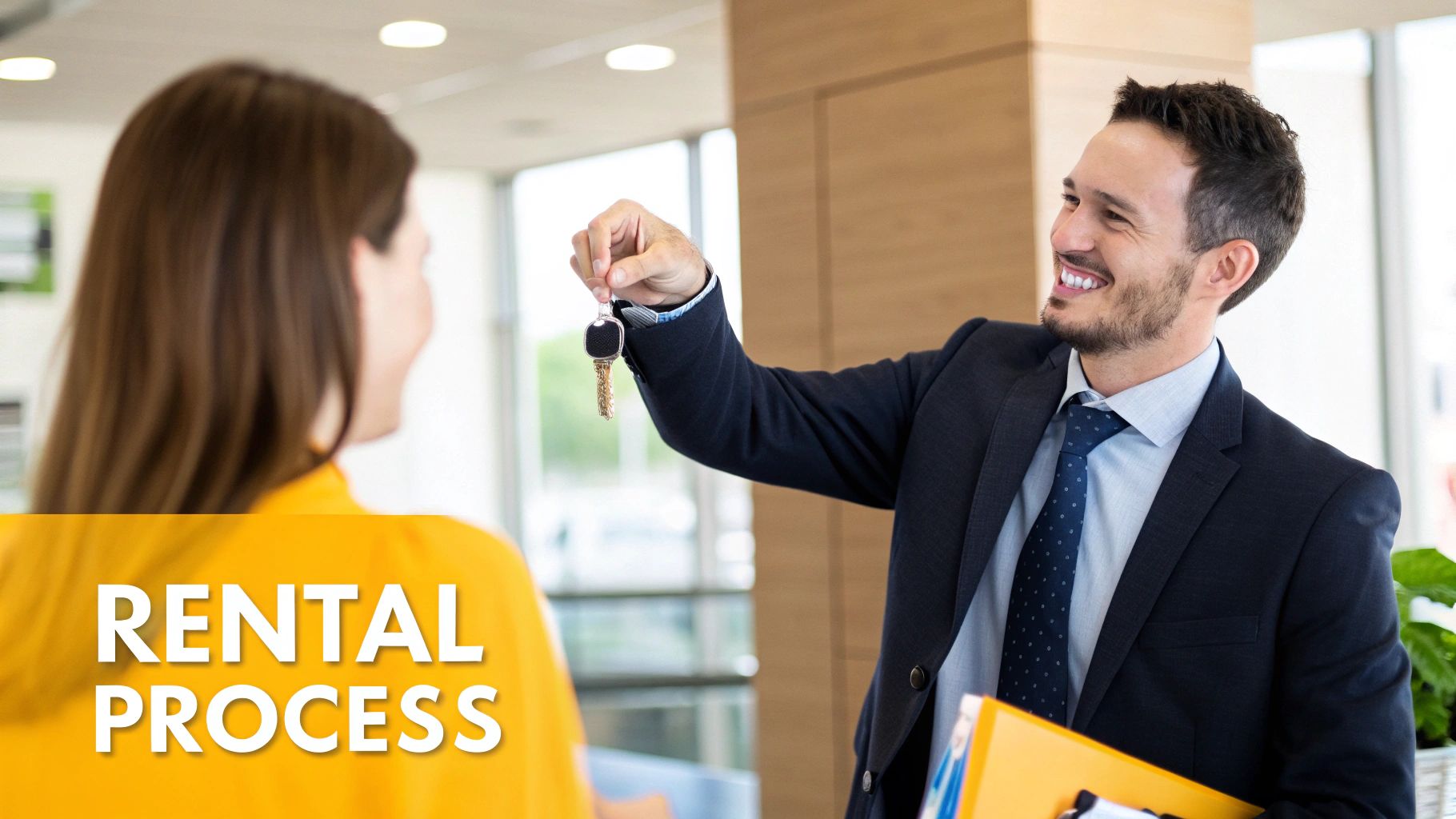
So, you've found a location appartement Fes that looks perfect. But before you get too excited, let's talk about the real numbers. The advertised monthly rent is just the beginning of the story. To avoid any nasty financial surprises, you need to get a firm grip on the total cost of living here.
From the moment you agree to a lease, you’ll be hit with a few significant upfront payments. This is standard practice across Morocco, so it’s crucial to factor these into your moving budget. Trust me, being unprepared for these can put a real strain on your finances before you've even unpacked a single box.
Breaking Down the Upfront Expenses
First up is the security deposit, known locally as the caution. This is a refundable sum you pay the landlord to cover any potential damages. Almost universally, this will be equivalent to one month's rent. For high-end or fully furnished places, don't be surprised if the landlord asks for two months' worth.
Next, you have the agent's fee. If you found your flat through a semsar (a local agent) or a real estate agency, their commission is due once the ink is dry on the lease. This is typically another month's rent, paid directly to them.
Right off the bat, you should be ready to hand over the equivalent of at least two, sometimes three, months' rent.
A crucial piece of advice: Always, and I mean always, get a formal, signed receipt for your security deposit. This piece of paper is your only proof of payment and will be your best friend when it’s time to move out and claim your deposit back.
This initial outlay is significant, which is why having a clear financial plan is non-negotiable. It’s what secures the property and ensures you start your tenancy on the right foot.
Projecting Your Monthly Bills
Once you're in, your ongoing expenses will naturally include more than just rent. Utilities are a major part of your monthly budget, and the costs can swing depending on your habits and the size of your apartment.
Here are the main utilities you’ll need to account for:
- Water and Electricity: In Fes, both are managed by one company, RADEEF. Your bill will fluctuate based on consumption—think air conditioning in the sweltering summer months or electric heaters during the chilly winter. For a standard two-bedroom flat, a reasonable estimate is between 300 to 600 MAD per month.
- Internet: A reliable connection is essential for most of us. The main providers are Maroc Telecom, Orange, and Inwi. A decent fibre optic connection will set you back about 250 to 400 MAD a month, which is plenty for remote work and streaming.
- Gas: Many flats use bottled gas (butagaz) for cooking and hot water. A large canister is cheap, usually around 40 MAD, and should last you a month or two, depending on how much you cook.
These costs might seem small on their own, but they add up quickly. Factoring them into your budget from day one is the best way to avoid any end-of-month panic. It's this overall affordability that keeps Fes so attractive. The rental market is influenced by local sales prices, which average around $900 per square metre—considerably lower than in other major Moroccan cities.
Financial Tips for Expats
If you're moving to Fes from another country, managing your money introduces a few extra wrinkles. Juggling international bank transfers and a new currency requires a bit of foresight.
My top recommendation for anyone staying long-term is to open a local Moroccan bank account. It makes paying rent and bills—which are almost always handled in Moroccan Dirham (MAD)—so much simpler. While some modern landlords might accept a bank transfer, cash is still king, especially in the more traditional parts of the city.
When sending money from your home account, pay close attention to exchange rates and transfer fees. Using a dedicated international transfer service can save you a surprising amount compared to what your home bank will charge. Proper financial planning is a huge part of figuring out if a move to Morocco is right for you. To learn more, you can explore our detailed guide on why properties in Morocco are perfect for investment.
Finalising Your Moroccan Rental Contract
You’ve found the perfect apartment—congratulations! Now comes the most critical part of the process: sorting out the paperwork. This all hinges on the Moroccan rental agreement, known as a contrat de bail. Think of this document as your shield; it lays out all your rights and responsibilities, so getting it right is non-negotiable. Whatever you do, don't rely on a handshake or a verbal agreement. It’s a risk that simply isn't worth taking.
Here in Morocco, a formal, written contract is standard practice for a reason. It offers protection to both you and the landlord. You must insist on a written lease that is signed by both parties and has its signatures officially legalised (légalisation de signature). This is done at a local government office called a muqata'a. That simple stamp gives the contract its legal teeth, making it enforceable if a dispute ever arises. Without it, you’re left with very little legal standing.
This formal approach is becoming even more crucial as Morocco's property market heats up. We're seeing a huge wave of foreign investment—in fact, foreign direct investment in Moroccan real estate surged by over 55% by 2024. This is directly impacting rental markets in cities like Fes. For anyone interested in the broader trends, you can explore insights on the Moroccan real estate market to see how things are shifting.
Key Clauses To Look For In Your Lease
When you get your contrat de bail, don't just skim it. Take the time to go through the key clauses. If your French or Arabic isn't perfect, don't hesitate to ask for a translation or have a trusted Moroccan friend look it over with you. A little bit of clarity now can save you from massive headaches down the road.
Here’s what you need to zero in on:
- Lease Duration (Durée du Bail): Most rental contracts in Morocco run for one year. Check that the start and end dates are clearly written down.
- Rent and Payment Details (Loyer): The contract must state the exact monthly rent in Moroccan Dirhams (MAD) and specify the payment due date.
- Security Deposit (Caution): This is typically one or two months' rent. The precise amount needs to be recorded in the contract.
- Responsibilities (Obligations): This section details who is responsible for what, from minor fixes to utility bills. Pay close attention to how this is worded.
A common point of friction is figuring out who pays for repairs. The general rule of thumb is that tenants handle small, everyday things like changing a lightbulb. Landlords, on the other hand, are on the hook for major structural problems, like a leaky roof or serious plumbing issues. Make sure this division of responsibility is crystal clear in your lease.
The All-Important Walk-Through: L’État des Lieux
Before you even think about moving your boxes in, you need to conduct an état des lieux. This is a detailed inventory and condition report of the apartment, especially if it comes furnished. You and the landlord (or their agent) will walk through the property together, documenting every single imperfection—a scratch on the floor, a crack in a bathroom tile, a wobbly table leg.
Be obsessive. Take photos. Take videos. This document, which both you and the landlord must sign, is your best defense for getting your security deposit back when you move out. Without a thorough état des lieux, a landlord could easily blame you for pre-existing damage and use your deposit to cover the "repairs."
Know Your Rights as a Tenant in Fes
Understanding your basic rights as a tenant is incredibly empowering. Moroccan law gives you specific protections that are important to know. For example, a landlord can't just raise your rent mid-lease. Any potential increase must be explicitly written into the original contract.
Eviction is also a strictly regulated process. A landlord can’t just kick you out on a whim; they have to follow a formal legal procedure that includes giving you proper notice. Knowing these fundamentals can provide real peace of mind. For a much deeper look into the finer points of tenancy, our guide on what they don't tell you about renting in Morocco covers many of the unwritten rules.
Signing your lease is the final hurdle in your hunt for a location appartement Fes. By taking the time to truly understand the contract, meticulously documenting the property’s condition, and knowing your rights, you're setting yourself up for a secure and positive rental experience in this incredible city.
Of course. Here is the rewritten section, designed to sound like it was written by an experienced human expert.
Common Questions About Renting in Fes
When you’re trying to find a place to live in a city like Fes, you’re bound to have questions. It’s a place where ancient life and modern convenience mix in a way that can be confusing at first. Let's tackle some of the most common things people ask when looking for a location appartement fes so you can feel more confident in your search.
Is Speaking French or Arabic Necessary?
This is probably the number one concern for foreigners, and the honest answer is: it helps. A lot. While you don't need to be fluent, having a basic handle on French or, even better, Moroccan Arabic (Darija) can genuinely transform your experience, especially when it comes to negotiating.
In newer neighbourhoods like the Ville Nouvelle or if you're working with a big, professional real estate agency, you can usually manage with English. But if you’ve got your heart set on an authentic home deep in the Medina or you're using a local fixer (semsar), language skills become critical. Even just a few polite phrases in Darija show respect and build goodwill, which often translates directly into better rental prices and a warmer relationship with your landlord.
Imagine this: two foreigners want the same apartment. One relies entirely on a translation app, while the other can manage basic greetings and simple questions in French. Who do you think the landlord will feel more comfortable renting to?
If your language skills are minimal, your best bet is to bring a trusted local or a bilingual friend along for the most important steps, like signing the contract and doing the initial inspection. Your options—and your bargaining power—open up significantly when you can bridge the language gap.
What’s the Real Difference Between a Modern Flat and a Traditional Riad?
Choosing between a modern apartment and a traditional home (a Dar or Riad) isn't just about looks; it's a major lifestyle decision that will shape your day-to-day life in Fes.
A modern flat, which you'll mostly find in the Ville Nouvelle, gives you predictable comfort. You can count on standard plumbing, reliable central air conditioning and heating, a kitchen layout you're used to, and often building perks like a lift or secure parking. It feels familiar, much like living in any modern European city.
On the other hand, renting a traditional home in the Medina is an experience you can't get anywhere else. These homes are steeped in history, filled with stunning details like intricate zellige tilework, carved plaster, and peaceful inner courtyards. But this kind of authenticity comes with a few trade-offs.
- Infrastructure: The charm of a centuries-old building can sometimes mean older plumbing or quirky wiring.
- Accessibility: Most of the Medina is for pedestrians only. Getting your weekly shopping or a new piece of furniture to your door takes a bit more planning and effort.
- Climate Control: Traditional homes were masterfully designed for natural cooling, but they can feel chilly and damp in the winter and might lack the powerful AC you’d find in a new build.
Ultimately, your choice comes down to what you value more: the ease of modern living or the rich, immersive experience of history.
How Can I Make Sure a Landlord or Semsar Is Legitimate?
Trust is everything in a rental deal, and you shouldn't feel bad about doing your homework to avoid a scam. Any legitimate landlord or agent will understand your need for peace of mind.
For a semsar, the best vote of confidence is a personal recommendation. Ask other expats, your colleagues, or local shop owners you trust if they know someone reliable. A good semsar has a reputation to uphold and won't risk it with shady practices.
When you're dealing directly with a landlord, the key is asking for proof of ownership.
Before a single dirham leaves your hands, politely ask to see the landlord’s ID (their CIN or passport) and the official property title deed, known as the titre de propriété. A real owner will have these documents and won’t have a problem showing them to you.
Be very cautious of anyone who pressures you for a big payment before you’ve seen the apartment and have a formal contract in hand. Using a registered real estate agency adds another layer of security, as they have their own procedures for vetting owners.
Are Furnished Apartments a Good Idea in Fes?
Yes, absolutely. Furnished places, or appartements meublés, are very common here and are a great option for students, professionals on shorter contracts, and anyone new to the city. They save you the massive headache and expense of buying and moving furniture.
That convenience, however, means you need to be extra careful. The quality of furnishings can range from designer-level to tired and worn. When you find a furnished apartment you like, you must do a thorough inventory and condition check—the état des lieux—with the landlord right there with you.
Test everything. Turn on the TV, run the washing machine. Check the state of the mattress, the sofa, and the dining table. Most importantly, make sure your rental contract clearly says who is responsible for fixing or replacing these items if they break. Furnished apartments cost more, so you have to weigh that extra rent against the convenience for how long you plan to stay.
Navigating the Fes rental market can be an exciting adventure, especially when you know what to look for. For personalised help and access to a curated selection of properties across Morocco, Rich Lion Properties offers expert guidance to make your search a success. Find your ideal home with our support.

